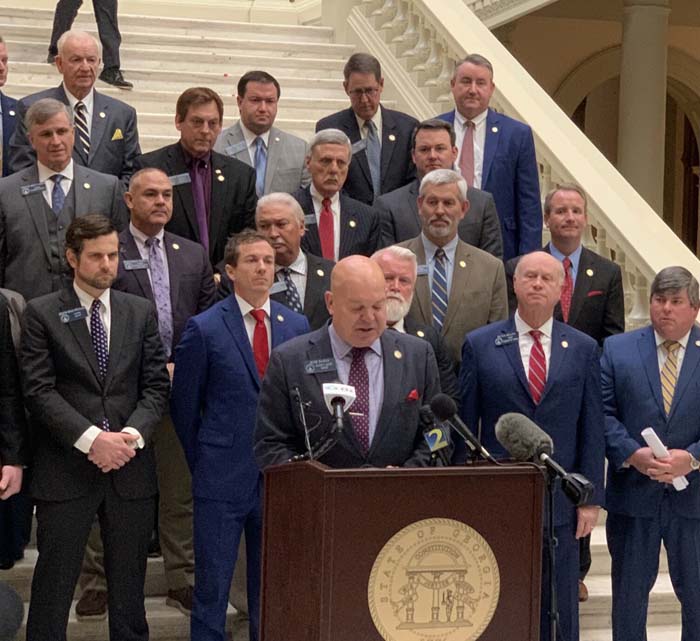Riot response, social media censorship among Ga. Senate Republican priorities
Published 10:30 am Wednesday, January 26, 2022

- Georgia Senate Majority Leader Mike Dugan, R-Carrollton, speaks during the Georgia Senate Republican Caucus' Jan. 25 press conference announcing its priorities for the 2022 legislative session.
ATLANTA — Georgia Senate Republicans plan to push legislation against lenient riot response and social media censorship as part of its priorities this legislative session.
While the Republican Caucus said it plans to support legislation for constitutional carry and mental health reform, members introduced their top four priorities during a press conference Tuesday: safety, security, students and workers — dubbed the #Fighting4.
Sen. Randy Robertson of Cataula introduced the Safe Communities Act of 2022 in response to riots and protests where buildings and property were looted and vandalized in Atlanta and other communities.
The bill would increase penalties for inciting a riot or mob intimidation, vandalism of private businesses and government property, assaulting first responders and obstructing a highway during unlawful assemblies.
“This legislation also holds cities accountable for their failure to provide resources to the men and women of public safety that they need to protect their citizens, Robertson said. “This unchecked violence has led to even more violence. When local elected officials made the decision to have law enforcement in the city of Atlanta to stand down, they should have been held accountable.”
On the topic of security, Cumming Sen. Greg Dolezal said Republican legislators are planning to introduce bills against Big Tech companies. One bill would require large online data resellers to allow users to opt into procurement of their personal data. Another, he said, would prevent social media platforms from censorship of users.
He attributed the censorship proposal to social media sites filtering or banning users for “false” claims of election fraud and COVID-19 information — most notably former President Donald Trump and U.S. Rep. Marjorie Taylor Greene.
“We need legislation to protect online users by allowing them to opt out the procurement and sale of their private and personal data, while providing recourse for violations of personal data loss,” Dolezal said. “… I will introduce legislation to protect Georgia users across all major social media platforms from the ongoing censorship that has unfairly targeted conservatives and anyone who seems to challenge the prevailing thought.”
Dolezal said the proposal would require social media companies to publish their standards for shadow banning, or blocking a user’s content, and would also require sites to allow users to opt out of shadow banning.
“With this legislation, Silicon Valley liberals will no longer be able to silence the voices of Georgians without making a transparent case with a justifiable cause,” he said.
While critical race theory isn’t taught in Georgia schools, Republicans in Georgia and other states have opposed its teachings, calling it divisive for students. The concept of CRT suggests that systemic racism is part of American society and is embedded in laws, policies and institutions that lead to racial inequalities. The Georgia Board of Education voted last year to oppose its teachings.
“The bottom line is this, we must ensure that no student is taught to feel guilty or less than because of how they were born,” said Sen. Bo Hatchett of Cornelia. “Scapegoating and stereotyping are not acceptable teaching methods period. … I believe we can reach a common ground. In the process, we can uphold free speech and academic freedom, while ensuring that our history—with all of its shining moments and its painful stains—is something we are able to learn from, not something that is stamped into our DNA.”
As it pertains to the fourth priority, Georgia workers, Republicans are backing $1.2 million in funding for the Technical College System of Georgia to expand its apprenticeship programs.
The Senate Republican Caucus declined to answer questions about its proposals until the bills have been filed.




